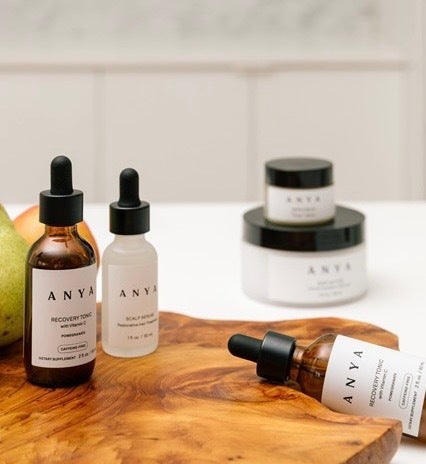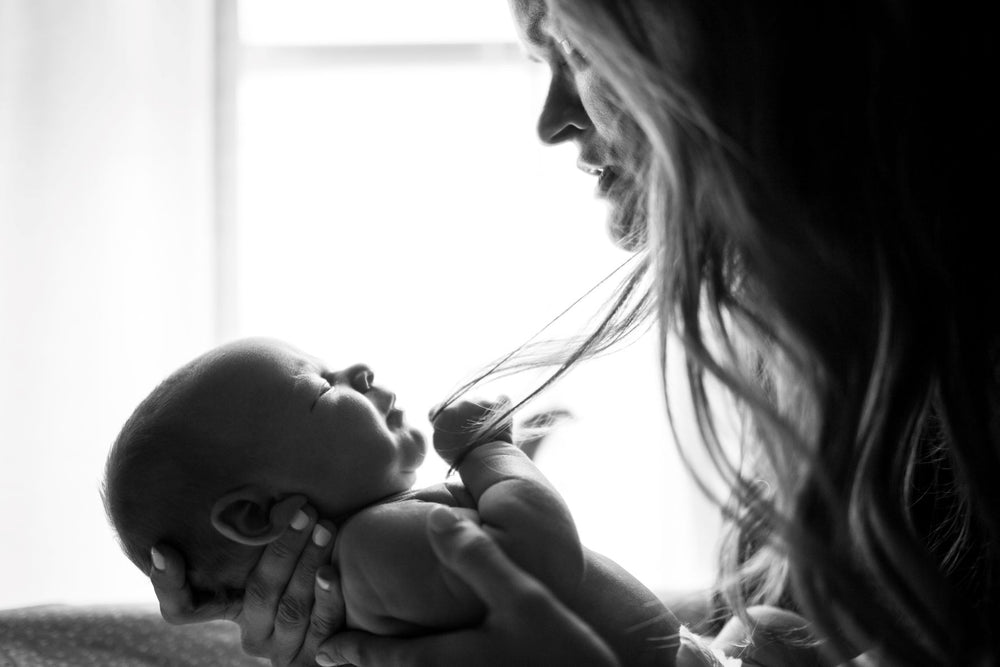The panic, the worries, and the big-life-questions of new motherhood may be common, but that doesn’t mean you should just grit your teeth and bear them (while also healing your body and feeding your new baby). We asked clinical psychologist (and mother of three) Julie Kupfer, PhD, for perspective on the stress of new motherhood, the means to navigate this transition, and how to know when you need help.
Q: Stress and anxiety are so typical for new mothers, but they sure don’t feel normal when you’re going through them. Can you help us distinguish between what’s typical and what needs a therapist’s support?
Absolutely. Longevity is really important. If you’re in the first two weeks, I would just roll through and be as patient as possible while also being mindful of the thoughts that you're having. If they're persistent beyond the first two weeks, you should reach out to your doctor or a medical professional. If stress is keeping you from the basic functions of caring for yourself, or if you have had any vulnerability or susceptibility to anxiety in general and/or OCD in the past, you should seek help sooner.
Q: What about just lots of worrying? How much checking that the baby is breathing at night is normal?
This is where it's very tricky because it's incredibly normal to worry. Is the baby sleeping? Did I choose the right diapers? Will this formula be okay? Did they eat enough? The important distinction between what feels normal and not is the distress that it's causing you. Try to be mindful of that and be your own gauge. And you can ask your parents or your friends to kind of see how you're doing with that, too.
Clinically, what we look for is impairment of functioning. Obviously, there's more grace given to new mothers because our functioning has completely been disrupted—sometimes you simply can’t brush your teeth until 4 p.m. But if you are constantly checking on the baby or having intrusive thoughts about baby’s safety so much that you can't relax and even have a moment— even when the baby is calm and when the pediatrician has affirmed that medically the baby is thriving—that is absolutely time to seek professional help.
We also look for anhedonia, which is the lack of joy, just feeling really disconnected and dreadful. If you’re dreading when the baby wakes next because you’re so worried about what’s going to happen next, that’s a red flag to us.
Q: As a therapist, how do you help women get through that?
It’s important to help new mothers build a different relationship to these thoughts. The thoughts are sometimes upsetting, but they are just thoughts. We have hundreds, if not thousands, of thoughts a day. What we’re doing is judging ourselves for having them, and that's what really fuels a difficult cycle. Reproductive therapists can help you hold your thoughts, to normalize them, to provide psycho-education, and to help you feel less alone and less scared by the fact that you're having them. If you can do that, you’re more able to contain the thoughts, maybe even embrace them, and then kind of turn down the noise on them.
Q: What about all of the other stressors that crop up that aren’t the baby? All of the dishes we aren’t doing, or managing visitors while the house is a mess?
I tell the women I work with to remember to try to embrace the beautiful chaos and uncertainty that is postpartum. And honestly, I would encourage new mothers to take a picture of it. To remember that this is something that might be so terrifying to you in a way that you would never want anyone to see. But let’s de-stigmatize that. It's the reality of being a new mom that you're going to have diapers surrounding your bed. I think there's something gorgeous about trying to embrace the chaos in action. Seeing it as something that you might want to remember at some point, and to give yourself permission to be in the trenches to document it.
You can reframe your thoughts about cleanliness positively, too. Guess what? Laundry didn't happen today? Luckily, the baby still has enough clean onesies. That said, cleanliness gives us a sense of control when our world is so unpredictable and turned upside down. So I want women to be able to benefit from having their environment feel stabilized and serene when necessary.
Q: But how? How does anyone find serenity amid the mess and diapers and laundry?
Two things: First, either by outsourcing or guiding, giving directions to someone else while you are hands-on with the baby or taking care of yourself. The cleaning, the cooking, the organizing of the meal trains from friends can all be done by someone who isn’t you. And second, if tidiness is important to you, carve out your own small space for it, just one section of your room rather than the whole house. The glider with a little table next to it, or have a laundry basket that you can throw in a closet so you don't have to look at it every second.
Q: Thank you for acknowledging that things like laundry piles impact mental health and that we deserve help. What about the existential stuff that can crop up for many women who start to realize like, oh my God, if something happens to me, I'm responsible for this child. What can you do with those big feelings about mortality?
It’s about inviting in how scary and terrifying that seems. And for maybe one of the first times in our life, there's a being that's dependent on us and that's a whole lot of responsibility to take in. Hold that.
Love and loss are two sides of the same coin. We're developing love for this child. We're getting to know them. And with that is the potential and possibility of loss of baby, and loss of self. And it's a normal part in the motherhood transition to experience this micro-separation. We're basically one being during pregnancy, and for all intents and purposes, these babies are tiny parasites. And as we have these separations, we experience grieving. I would embrace it, you know, I would hold it. Really validate and normalize why that thought is coming up. That we are learning to love something and that with that love comes loss and thoughts and feelings of loss. That is completely normal, which is worth reminding yourself. The mind always wants to live in the past or the future. So try to remind yourself to stay in the present.
Q: Are there holistic approaches you can take to manage your own stress by keeping yourself healthy? Are there certain foods to eat or avoid?
It's very in line with getting back to basics in terms of making sure you're eating healthy, taking care of yourself, whatever form that takes for you. There is a wonderful book called The First 40 Days about feeding yourself and nourishing yourself based on what your body has just been depleted of.
But the main thing is to nurture yourself. Try natural ways of creating those natural endorphins, like exercise when your healthcare provider deems it safe. Destressing with deep breathing, progressive muscle relaxation, or a hot shower can help. Holding your baby will release oxytocin. Or journaling—maybe it’s a few journal entries, writing to your baby, saying, “I’m doing these things to be healthy and take care of myself. I want you to know how loved you are and that I’m going to do my best.” Look for your village, your tribe, remember that this baby hopefully is surrounded by many people who will love and take care of them.
Q: Are there any patterns you see in your patients that could help educate us?
The number-one thing I see is loneliness. It’s the biggest source of stress. Just feeling lonely, even if you're surrounded by people, even if you're with a baby non-stop, even if everyone has come to visit the baby. And then also, self-comparison, the “not-good-enoughs.”
Q: How do you address those?
Most of my clients and I talk about what social media looks like, what they thought motherhood was going to look like versus how they're actually feeling on the front lines. And I think particularly as women, if there's anything we can offer each other, it's to normalize and make this all feel more realistic. We are all just trying to do our best, and that’s so beautiful.
That’s why baby groups are helpful. If you live in a place where you can actually connect with live people, I would take it offline. There’s some service to connecting online, but we can easily go down rabbit holes. I don't think that anything replaces in person face-to-face experiences, hand on your arm passing you a tissue.
And at first if you’re talking a lot about breastfeeding and diapers and poop and reflux and vomiting, that's wonderful. At some point too, though, you also might want to grab a glass of wine with one of these moms or go to a concert. So you’re not just there for baby advice but because you’re human and you happen to have this wonderful thing in common. It’s an interesting thing with these new mom groups. You can know everything about someone’s birth story, how her vagina is healing, about if she’s able to have sex with her husband, but don’t know what her favorite cocktail is. So go to the mommy and me yoga, but then also go out afterwards, too.






